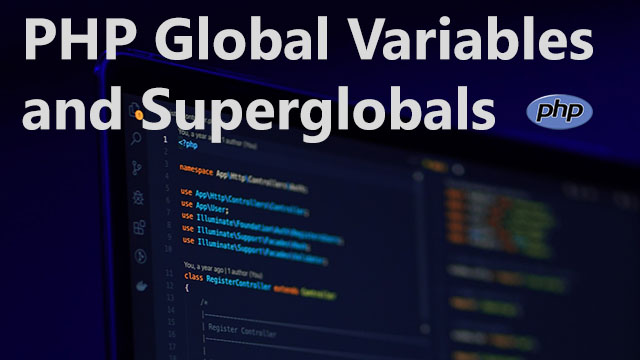PHP Global Variables and Superglobals: Understanding the Global Scope in PHP

Global variables in PHP are essential for transferring data throughout many application scopes. There are a number of preset global variables in PHP referred to as "superglobals" that make it simple to access different kinds of data. We will examine PHP global variables and dig into the world of superglobals in this blog article. By the conclusion, you'll have a firm grasp on the best ways to use global variables in PHP code.
Table of Contents:
- Understanding Global Variables
- Introduction to Superglobals
- The Superglobals in PHP
- 3.1. $_GET
- 3.2. $_POST
- 3.3. $_REQUEST
- 3.4. $_SERVER
- 3.5. $_SESSION
- 3.6. $_COOKIE
- 3.7. $_FILES
- 3.8. $_ENV
- Best Practices for Using Superglobals
- Conclusion
1: Understanding Global Variables:
In PHP, global variables are variables that can be accessed from anywhere within the program. They are not limited to a specific function or block of code and can be used throughout the script. Global variables enable data sharing between different parts of your PHP application.
2: Introduction to Superglobals:
Superglobals are a special category of global variables provided by PHP. These variables are predefined and accessible in all scopes, including functions, classes, and even inside included files. Superglobals simplify the process of accessing and manipulating common data, such as form inputs, server information, and session data, without the need for explicit variable declarations or passing parameters.
3: The Superglobals in PHP:
PHP provides several superglobals that grant access to different types of data. Let's explore some of the most commonly used superglobals:
3.1. $_GET:
The $_GET superglobal is used to retrieve data sent via the HTTP GET method. It contains key-value pairs of data passed through the URL query string. You can access specific values using their corresponding keys.
3.2. $_POST:
The $_POST superglobal is used to retrieve data sent via the HTTP POST method. It contains key-value pairs of data submitted through HTML forms. Similar to $_GET, you can access specific values using their respective keys.
3.3. $_REQUEST:
The $_REQUEST superglobal is a combination of $_GET, $_POST, and $_COOKIE. It allows you to access data from both GET and POST requests, as well as cookies. However, it's important to note that $_REQUEST may not be suitable in all situations due to security considerations.
3.4. $_SERVER:
The $_SERVER superglobal provides access to various server-related information. It contains details such as the current page's URL, request method, user agent, and more. $_SERVER allows you to obtain crucial environmental data that can be used for different purposes, such as generating dynamic content or handling URL routing.
3.5. $_SESSION:
The $_SESSION superglobal enables you to store and retrieve session-specific data across multiple requests. It stores data on the server and associates it with a unique session identifier (usually stored in a cookie). $_SESSION is useful for maintaining user-specific information and implementing user authentication and personalized experiences.
3.6. $_COOKIE:
The $_COOKIE superglobal contains data stored in cookies sent by the client browser. Cookies are small pieces of data stored on the user's computer. $_COOKIE allows you to retrieve and manipulate the cookie values, such as retrieving user preferences or maintaining user sessions.
3.7. $_FILES:
The $_FILES superglobal is used to retrieve information about uploaded files in PHP. It provides access to file-related data, such as the file name, type, size, and temporary location on the server. $_FILES is essential for handling file uploads in PHP applications.
3.8. $_ENV:
The $_ENV superglobal gives you access to environment variables. Environment variables are values set by the operating system or web server, which can be useful for storing configuration settings or sensitive information.
4: Best Practices for Using Superglobals:
While superglobals offer convenient access to data, it's important to follow some best practices to ensure secure and reliable usage:
- Sanitize and validate user input: Since superglobals often contain user-submitted data, it's crucial to sanitize and validate the input to prevent security vulnerabilities such as SQL injection or cross-site scripting (XSS) attacks.
- Avoid direct manipulation: It's generally recommended to avoid directly modifying superglobal variables. Instead, assign their values to local variables and work with the local variables to ensure data integrity and prevent accidental changes to the original superglobals.
- Use appropriate security measures: Be cautious when dealing with sensitive data, such as passwords or user authentication. Apply encryption, hashing, or other security measures to protect sensitive information stored in superglobals.
- Understand scope and access: Remember that superglobals are accessible from anywhere within your PHP code. Be mindful of their scope and consider the potential impacts on data sharing and security.
- Keep performance in mind: Superglobals may impact performance, especially when dealing with large datasets. Avoid unnecessary operations and only retrieve the necessary data to optimize performance.
In conclusion, by facilitating data sharing and granting simple access to diverse sorts of information, global variables and superglobals serve a crucial function in PHP development. Working successfully with form data, server data, sessions, cookies, and other data requires an understanding of how to use global variables and superglobals.
In this article, we looked at the idea of global variables, explained superglobals, and spoke about several popular superglobals in PHP. We also emphasized the best practices for using them, with a focus on security and performance issues.
You may increase the functionality of your PHP programs, enable data sharing, and create strong and dynamic online solutions by utilizing the power of global variables and superglobals.
PHP programming is fun!